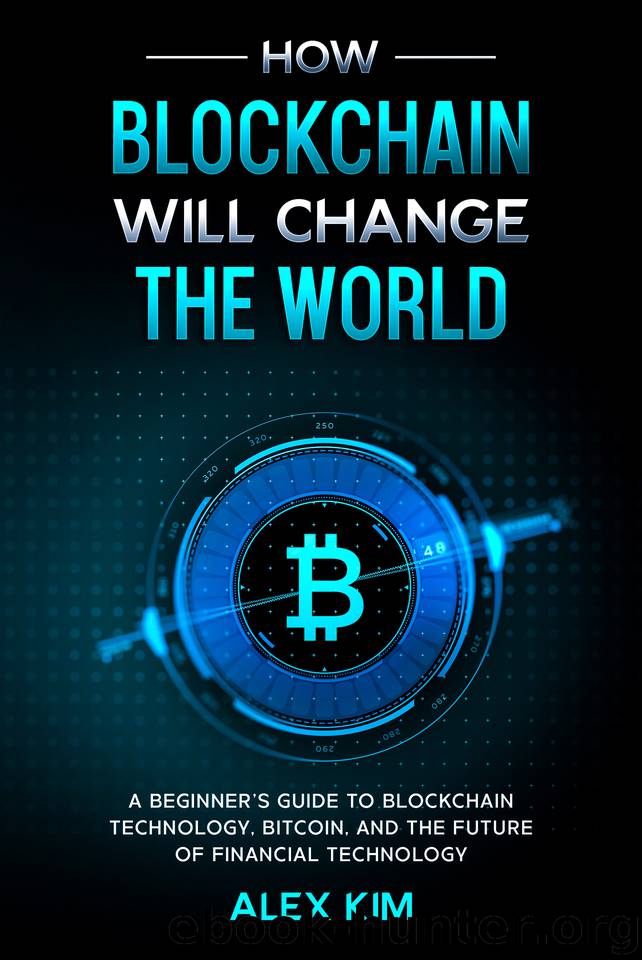How Blockchain will Change the World : A Beginner’s Guide To Blockchain Technology, Bitcoin, and the Future of Financial Technology by Kim Alex

Author:Kim, Alex [Kim, Alex]
Language: eng
Format: epub
Published: 2020-06-23T16:00:00+00:00
Decentralization
D ecentralization is not a new concept. It has long been used in the areas of strategy, management, and governance. The basic idea of decentralization is to extend control and authority over the periphery, rather than giving one central body complete control over the organization. This means several benefits for organizations, such as greater efficiency, faster decision-making, better motivation, and less administrative burden. In this section, the concept of decentralization will be addressed in the context of the blockchain; The goals of the two are similar, with no central authority in control. Decentralization and decentralization modes will also be presented with some examples. Blockchain ecosystem decentralization, decentralized applications, and decentralization platforms will be further discussed.
Decentralization using blockchain
Decentralization is a fundamental advantage and service provided by blockchain technology. Blockchain is by design the ideal vehicle to provide a platform that requires no intermediaries and can work with many different leaders selected through consensual mechanisms. This model allows anyone to compete and becomes a decision-making authority. This contest is governed by a consensus mechanism, and the most commonly used method is known as "proof of work."
Decentralization is implemented to varying degrees, from semi-decentralized to fully decentralized, according to needs and circumstances. Decentralization can be seen from a blockchain perspective as a mechanism to modify existing applications and paradigms or create new applications for complete control of users. Information and communication technologies (ICTs) are generally based on a centralized paradigm according to which databases or application servers are controlled by a central authority, such as a system administrator. With Bitcoin and the introduction of blockchain technology, this model has changed, and technology is available that allows anyone to run a decentralized system (and allow it to operate without any failure or reliable authorization). It can run on its own or require human intervention, depending on the type and model of government used in a decentralized application running in the blockchain.
Centralized systems are traditional computer systems (client-server) in which one body controls the system and is solely responsible for all system operations. All central system users depend on one source of service. Internet service providers, such as eBay, Google, Amazon, the Apple App Store, and most other providers, use this common service model. In a distributed system, contrarily, data, and budgets are distributed across several nodes in the network. Sometimes this term is mixed up with parallel computing. Although the definition overlaps, the main difference between the two systems lies in the fact that in a parallel system, all nodes perform the calculation simultaneously to obtain a result, whereas in a distributed system, the calculation cannot be made in parallel and data is replicated only to multiple nodes that users consider to be a unique and consistent system. Both models are used with variations to achieve tolerance and error rate. In this model, there is always a central body that controls all nodes and controls processing. This means that the system is always centralized.
The main difference between a decentralized system and a distributed system
Download
This site does not store any files on its server. We only index and link to content provided by other sites. Please contact the content providers to delete copyright contents if any and email us, we'll remove relevant links or contents immediately.
International Integration of the Brazilian Economy by Elias C. Grivoyannis(109889)
The Radium Girls by Kate Moore(12017)
Turbulence by E. J. Noyes(8040)
Nudge - Improving Decisions about Health, Wealth, and Happiness by Thaler Sunstein(7690)
The Black Swan by Nassim Nicholas Taleb(7106)
Rich Dad Poor Dad by Robert T. Kiyosaki(6607)
Pioneering Portfolio Management by David F. Swensen(6288)
Man-made Catastrophes and Risk Information Concealment by Dmitry Chernov & Didier Sornette(6004)
Zero to One by Peter Thiel(5786)
Secrecy World by Jake Bernstein(4740)
Millionaire: The Philanderer, Gambler, and Duelist Who Invented Modern Finance by Janet Gleeson(4465)
The Age of Surveillance Capitalism by Shoshana Zuboff(4274)
Skin in the Game by Nassim Nicholas Taleb(4237)
The Money Culture by Michael Lewis(4198)
Bullshit Jobs by David Graeber(4179)
Skin in the Game: Hidden Asymmetries in Daily Life by Nassim Nicholas Taleb(3987)
The Dhandho Investor by Mohnish Pabrai(3758)
The Wisdom of Finance by Mihir Desai(3731)
Blockchain Basics by Daniel Drescher(3574)
